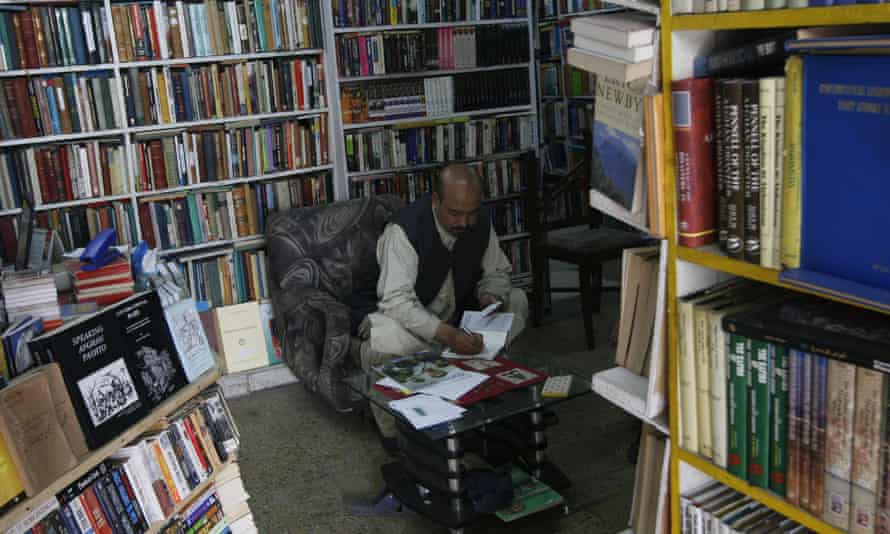HMade famous by the international bestseller The Bookseller of Kabul, he survived a series of repressive regimes in Afghanistan. But two decades later he is living in a London Home Office hotel after fleeing the Taliban to seek asylum in Britain.
Shah Muhammad Rais, 69, arrived in the UK on September 26 and applied for asylum at the airport. He is waiting for his case to be processed and is currently living with other asylum seekers from different conflict zones.
“Britain was the only door open to me to be safe from the Taliban,” he told the Guardian.
Members of his family, including his nine children and four grandchildren, are scattered across different parts of the world. But his bookstore in Kabul is still open after the Taliban takeover, along with an online bookstore. He proudly presents his business card – Shah M Book Co, Printer, Publisher, Bookseller, Shah Muhammad Rais, Managing Director.
Times are tough for the independent book trade, however, and Rais is unsure if the business, established in 1974 and surviving nearly five turbulent decades, can withstand the current challenges posed by the Taliban.
“Very few buy books today,” he says sadly. One of the consequences of the Taliban takeover was a mass exodus of intellectuals and others who were part of the book-buying group when British and US forces were on the ground in Afghanistan.
“I’ll keep the bookstore open as long as possible, maybe the Taliban will ban it or destroy it,” he shrugs.
Rais lived through different rules in Afghanistan and was imprisoned twice during the Soviet era, first in 1979 for a year and then again for a year and a half after his release. He says he experienced torture and ill-treatment in prison, including sleep deprivation and being forced to live in freezing conditions.
Åsne Seierstad, a Norwegian journalist, traveled to Afghanistan shortly after 9/11 and returned the following spring to write an intimate portrait of the life of an Afghan family – the bookseller Rais, his two wives and his – for an account of life in the country to write family. The book is based on her account and observations after being invited to move in with the family she lived with for five months.
Rais rose to fame after publishing the book in 2002, which topped the international sales charts and was translated into dozens of languages. However, he and members of his family filed legal action against the author, claiming the book was inaccurate and invasive.
After a protracted legal battle, an appeals court in Norway acquitted the author of encroaching on the family’s privacy and concluded that the book’s facts were correct.

The Rais Bookstore is believed to have the largest collection of books on Afghanistan, expressing a variety of different perspectives on historical events under one roof. In addition to textbooks for students in fields like medicine, engineering, and languages, there are many rare books that Rais has found safe hiding places for in case his shop is targeted.
“I have safe locations in Iran and Pakistan for some of the books,” he says.
He speaks six languages and says regretfully that he has forgotten a seventh, which he used to know – Russian.
After earning his master’s degree in Civil Engineering from Kabul University, he found engineering to be impossible for a living and decided to turn his teenage love of books into a career.
In addition to his vast and diverse collection of Afghan books, he loves classics, including works by Tolstoy, Balzac and Hemingway, as well as his favourite, the 13th-century Persian poet Rumi. “I loved reading Shakespeare’s Othello in Persian,” he says.
“From 2002 to 2020 I sold over 15,000 copies of European and US literature,” says Rais. He says his goal has always been to reflect a variety of views about significant events in history, rather than to take one side or the other.
“I’m on the side of sincerity,” he says. “The Soviets put me in jail for collecting decrees from Mullah Omar and other jihadist newspapers that I received in Pakistan. I said to the judge: ‘Tomorrow we need these papers to study Afghan jihad – to understand your enemies.’”
In better times, his bookshop was a meeting place for intellectuals of all backgrounds to gather, sit on mattresses and listen to international news on a good radio and discuss political and philosophical issues of the day.
Now Rais’s future is uncertain as he eagerly awaits the outcome of his asylum application. And particularly distressing for a lover of books, he now suffers from a visual impairment. But his energy and enthusiasm are undiminished.
“If I get permission to work in the UK I would like to open an Afghan reading room in the British Library. I am writing a book about Afghan country, culture and history and I would like to open a multicultural, multilingual bookshop here for people from the region – from Pakistan, Bangladesh, Iran. That’s what I dream of.”

